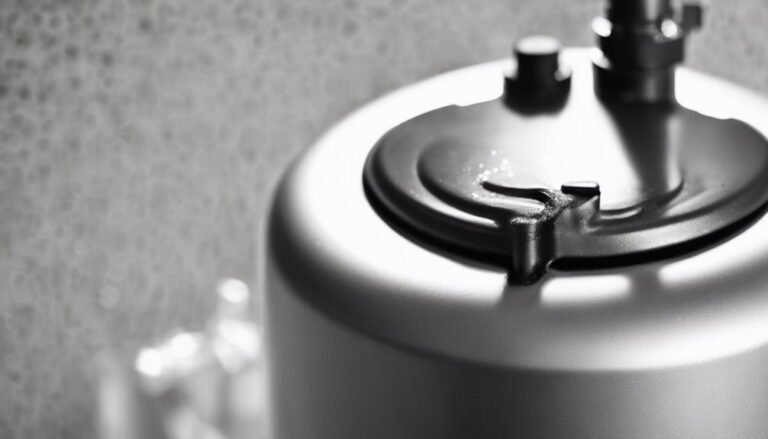Do I Need a Filter Before My Water Softner?
Imagine you've just moved into a new home with hard water issues, and you're considering a water softener to improve your water quality. While a softener can help with mineral buildup, you might be overlooking an important step: installing a filter beforehand. A filter can remove sediments and contaminants that could hinder your softener's performance. But how do you determine if this extra layer of protection is necessary for your specific situation? Understanding the interplay between your water quality and softener efficiency might just save you time and money.
Key Takeaways
- A filter removes sediment and contaminants, enhancing water quality before it reaches the softener.
- Improved water quality boosts the efficiency and longevity of your water softener.
- Filters prevent mineral buildup in appliances, reducing repair costs and maintenance needs.
- Using a filter before softening enhances the effectiveness of soaps and detergents.
- Regularly maintaining a filter saves money long-term by lowering utility bills and extending softener life.
Understanding Water Softening
Water softening is a process that helps reduce hard minerals like calcium and magnesium in your water supply. When you use a water softener, it exchanges these hard minerals with sodium or potassium ions, improving your water quality.
This softening process can prevent scale buildup in your plumbing, appliances, and fixtures, prolonging their lifespan and reducing maintenance costs.
Hard water can lead to various issues, from soap scum on your dishes to dry skin after showers. By investing in a water softener, you're making a significant improvement in your daily life.
The benefits extend beyond just enhancing your water's feel; soft water can also help your soaps and detergents work more effectively, leading to cleaner laundry and dishes.
It's important to understand the softening process and its impact on your home. You'll notice smoother skin, shinier hair, and cleaner surfaces.
In addition, using softened water can save you money and time on cleaning products and repairs. So, if you're considering a water softener, know that you're not just altering your water; you're improving your overall household experience.
Common Water Contaminants
When it comes to water quality, you're likely dealing with various common contaminants.
Hard water minerals, sediment, and even chemical pollutants can affect your water supply, impacting everything from your appliances to your health.
Understanding these contaminants will help you decide whether you need a filter before your water softener.
Hard Water Minerals
In many households, hard water minerals can pose significant challenges. These minerals, primarily calcium and magnesium, can lead to various hard water effects that impact your daily life. You might notice mineral buildup in appliances, on faucets, and even in your hair and skin.
- Dull, lifeless hair that's hard to manage
- Stains on dishes and glassware that won't come off
- Clogged pipes and appliances that decrease efficiency
These hard water effects can cause frustration and additional expenses over time. The mineral buildup not only affects your water-using appliances but also makes your soap and detergents less effective.
You'll find that it takes more effort to achieve the same cleanliness, whether you're doing laundry or washing dishes.
If you're experiencing these issues, it might be worth considering a filtration system before your water softener. By filtering out hard water minerals, you can enhance the efficiency of your softener and prolong the life of your appliances.
Ultimately, addressing hard water minerals early on can save you time and money, making your home more comfortable and efficient.
Sediment and Particulates
Hard water isn't the only issue you might face in your home; sediment and particulates can also cause significant problems. These tiny particles—like dirt, rust, and sand—can accumulate in your plumbing and appliances, leading to sediment buildup.
This buildup not only affects water quality but can also reduce the efficiency of your water softener, causing it to work harder than necessary.
One effective way to combat this issue is through particulate removal. Installing a sediment filter before your water softener helps catch these unwanted particles, ensuring that cleaner water enters your softening system.
By removing sediment, you protect your appliances from damage and extend their lifespan. Plus, you'll enjoy better water quality for drinking, cooking, and bathing.
Ignoring sediment and particulates can lead to costly repairs and decreased efficiency. So, consider the benefits of a sediment filter.
It's a straightforward step that can save you time and money in the long run. Investing in a proper filtration system not only enhances your water softener's performance but also improves the overall quality of your home's water supply.
Chemical Contaminants
Chemical contaminants can pose serious risks to your health and the quality of your water. These substances can seep into your drinking water, often without your knowledge, leading to potential chemical exposure and various health risks.
It's vital to understand what these contaminants are to guarantee your water remains safe.
Consider some common chemical contaminants you might encounter:
- Lead: Often found in older plumbing, it can cause serious developmental issues, especially in children.
- Chlorine: While used for disinfection, high levels can lead to respiratory problems and skin irritation.
- Pesticides: Residues from agricultural practices can contaminate water supplies, posing risks of cancer and other health issues.
Benefits of Water Filters
A water filter can greatly enhance the quality of your drinking water, providing numerous benefits that contribute to better health and taste.
First and foremost, using a filter can lead to significant health benefits. By removing harmful contaminants, like chlorine and lead, you're lowering the risk of various health issues, including gastrointestinal problems and neurological disorders. Clean water is essential for a healthy lifestyle, so investing in a filtration system pays off in the long run.
Additionally, you'll notice a taste improvement that can make a world of difference. Unfiltered water often carries unpleasant odors and flavors from chemicals and impurities. With a good filter, you'll enjoy crisp, clean-tasting water that's invigorating to drink. This can encourage you to stay hydrated, which is vital for maintaining overall health.
Moreover, filtered water can enhance the flavor of beverages like tea and coffee, making your daily rituals even more enjoyable.
Types of Filters Available
When it comes to improving your water quality, understanding the types of filters available is essential. Each filter type has unique features that contribute to filter efficiency, so knowing what's out there will help you make informed decisions.
- Sediment Filters: These remove dirt, sand, and larger particles from your water, guaranteeing it's clean before it reaches your water softener.
- Activated Carbon Filters: These filters excel at removing chlorine, volatile organic compounds (VOCs), and other harmful chemicals, enhancing taste and odor.
- Reverse Osmosis Systems: These advanced filters push water through a semi-permeable membrane, effectively removing a wide range of contaminants, including heavy metals.
Each of these filter types serves a specific purpose and can greatly enhance your water's quality. By understanding their functionalities, you can choose a filter that aligns with your needs, ultimately improving your water softener's performance.
Keep in mind that the right filter not only prolongs the life of your softener but also guarantees that you're using the best water possible for your home.
Impact on Water Softener Efficiency
Filters play a crucial role in enhancing the efficiency of your water softener. When you install a filter before your softener, you can improve filter effectiveness by removing sediment, dirt, and other impurities from your water supply. This not only guarantees that your softener works more effectively but also means it doesn't have to work as hard, which can greatly prolong its longevity.
Without a filter, contaminants can enter your softener, leading to clogs and inefficiencies. Over time, this can decrease its performance, requiring more frequent maintenance and resulting in higher energy and salt usage. By utilizing a filter, you help maintain consistent water quality, allowing your softener to operate at ideal levels.
Moreover, a clean water supply translates into less wear and tear on your unit, assuring it lasts longer and operates efficiently. Investing in a good filter can save you from costly repairs and replacements down the line.
In short, prioritizing water filtration before your softener is a smart choice for maintaining both its efficiency and longevity, ultimately giving you better water quality for your home.
Cost Considerations
Investing in a filter before your water softener can have significant cost implications. A thorough cost analysis helps you understand the potential savings and expenses involved in your decision.
While it may seem like an extra upfront cost, a filter can protect your softener from damage and extend its lifespan, ultimately saving you money.
Consider these factors in your budget planning:
- Reduced repair costs: Preventing damage to your softener means fewer repairs and replacements.
- Increased efficiency: A filter can help your softener work more efficiently, lowering your utility bills.
- Long-term savings: Investing in a quality filter now can lead to substantial savings over time, as you won't need to replace your water softener as frequently.
Maintenance and Replacement Needs
To keep your water softener running smoothly, it's essential to stick to a regular maintenance schedule.
You should also be on the lookout for signs that your system needs replacement, like reduced efficiency or strange noises.
Staying proactive can save you time and money in the long run, so let's explore what to keep an eye on.
Regular Maintenance Schedule
Keeping your water softener in top shape requires a regular maintenance schedule to confirm it functions effectively. By sticking to this schedule, you can guarantee peak performance and longevity.
Here are some key maintenance tips to reflect on:
- Check salt levels: Regularly inspect the salt tank and refill it when necessary to maintain the softening process.
- Clean the brine tank: At least once a year, clean out the brine tank to prevent salt buildup and clogs.
- Inspect the system for leaks: Routine checks can help you catch any leaks early, avoiding more extensive repairs later.
Implementing these maintenance tips into your regular schedule won't only enhance your water softener's efficiency but also save you money in the long run.
Keeping an eye on these tasks helps prevent unexpected breakdowns and guarantees that your water remains soft and pleasant to use.
Plus, a well-maintained system contributes to better water quality, making your home more comfortable.
Signs for Replacement
When your water softener starts showing signs of wear, it's essential to recognize these indicators to avoid further issues. Ignoring these replacement indicators can lead to decreased efficiency and costly repairs. Here are some signs that your water softener might need replacement:
| Sign of Replacement | Description | Action Needed |
|---|---|---|
| Decreased Softening | Noticeably harder water despite treatment | Check system settings |
| Salt Consumption Issues | Excessive salt usage without results | Inspect brine tank |
| Rust or Scale Build-up | Visible mineral deposits in fixtures | Clean or replace parts |
| Unusual Noises | Strange sounds during operation | Consult a technician |
| Filter Lifespan Exceeded | Filters not replaced within the recommended time | Replace the filter |
Making the Right Choice
Choosing the right setup for your water system can greatly impact its efficiency and effectiveness.
When considering whether to install a filter before your water softener, it's vital to evaluate your water quality and the type of filtration systems available. A well-chosen filter can extend the life of your softener and enhance the overall quality of your water.
Here are a few key factors to think about as you make your decision:
- Contaminant Removal: Filters can eliminate impurities like sediment, chlorine, and heavy metals.
- Water Hardness: Understanding the hardness of your water helps in selecting the right softener.
- Maintenance Needs: Different systems require varying levels of upkeep, so choose one that fits your lifestyle.
Frequently Asked Questions
Can a Filter Improve Water Taste Before Softening?
A filter can enhance your water's taste considerably. By improving water quality before softening, you remove impurities that affect flavor. You'll notice a revitalizing difference, making your drinking experience much more enjoyable overall.
Will a Filter Prevent Damage to My Water Softener?
A filter can improve water quality by removing sediments and impurities that might damage your water softener. Different filter types, like sediment or carbon filters, help protect the system and enhance its longevity.
How Often Should I Replace the Filter Before Softening?
Think of your filter as a loyal guardian, tirelessly protecting your water softener. To keep its lifespan ideal, replace it every three to six months, aligning it with your maintenance schedule for peak performance and efficiency.
Do I Need a Filter if My Water Is Already Soft?
Even if your water's soft, you might still benefit from a filter. It can improve water quality by removing impurities, enhancing taste, and protecting your plumbing. Consider a filter for overall better water experience.
Can I Use a Reverse Osmosis System With a Water Softener?
Absolutely, a reverse osmosis system's remarkable benefits complement your water softener nicely. They're compatible, enhancing your water quality. Just guarantee you maintain both systems properly for peak performance and pristine drinking water. Enjoy the advantages!
Conclusion
To sum up, installing a filter before your water softener isn't just a smart choice; it's a game changer. By removing harmful contaminants, you guarantee your softener runs efficiently and lasts longer, saving you time and money. Think of it as putting on a seatbelt before a drive—it's just that essential for protecting your investment. So, don't wait; take this simple step to enjoy cleaner, softer water for your home and peace of mind for your family.







